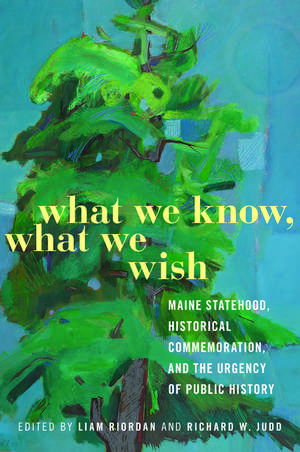What We Know, What We Wish: Maine Statehood, Historical Commemoration, and the Urgency of Public History
Editat de Liam Riordan, Richard W. Judden Limba Engleză Paperback – 27 iun 2025
This volume’s core argument is that academics need to collaborate more fully with independent scholars, history-based cultural institutions, and the general public in order for public history to thrive and to improve the quality of civic life. What We Know, What We Wish does this through wide ranging essays that discuss the long statehood era in Maine from the 1770s to 1820s as well as its legacies in the state centennial commemoration of 1920 and museum exhibits from the 2020 bicentennial. The occupational and cultural diversity of the collection’s contributors together with the content of their essays offer a model for how to put public history principles into practice to foreground meaningful historical reflection that is urgently needed in divided communities around the world.
Contributors include the volume editors, as well as Maulian Bryant, Osihkiyol (Zeke) Crofton-Macdonald, Charles H. Lagerbom, Ryan LaRochelle, Stuart Kestenbaum, Michael McVaugh, Kevin D. Murphy, Micah A. Pawling, Jessica Skwire Routhier, Donald Soctomah, Laura Fecych Sprague, Alan Taylor, and Laurel Thatcher Ulrich.
Preț: 222.99 lei
Nou
Puncte Express: 334
Preț estimativ în valută:
42.67€ • 44.71$ • 35.27£
42.67€ • 44.71$ • 35.27£
Carte nepublicată încă
Doresc să fiu notificat când acest titlu va fi disponibil:
Se trimite...
Preluare comenzi: 021 569.72.76
Specificații
ISBN-13: 9781625348609
ISBN-10: 1625348606
Pagini: 245
Ilustrații: 37 illus.
Dimensiuni: 152 x 229 mm
Greutate: 0.45 kg
Editura: University of Massachusetts Press
Colecția University of Massachusetts Press
ISBN-10: 1625348606
Pagini: 245
Ilustrații: 37 illus.
Dimensiuni: 152 x 229 mm
Greutate: 0.45 kg
Editura: University of Massachusetts Press
Colecția University of Massachusetts Press
Notă biografică
Liam Riordan is Adelaide C. and Alan L. Bird Professor of history at the University of Maine. He is author of Many Identities, One Nation: The Revolution and Its Legacy in the Mid-Atlantic and was the co-editor with Jerry Bannister of The Loyal Atlantic: Remaking the British Atlantic in the Revolutionary Era. He currently serves on the City of Bangor’s Historic Preservation Commission and the board of the Great Pond Mountain Conservation Trust. He is a past board member of the Maine Humanities Council and past director of the Clement and Linda McGillicuddy Humanities Center at the University of Maine.
Richard W. Judd is a professor emeritus of history at the University of Maine. His most recent book is Democratic Spaces: Land Preservation in New England, 1850-2010. Judd is the author of numerous books, including Finding Thoreau: The Meaning of Nature in the Making of an Environmental Icon and Second Nature: An Environmental History of New England.
Richard W. Judd is a professor emeritus of history at the University of Maine. His most recent book is Democratic Spaces: Land Preservation in New England, 1850-2010. Judd is the author of numerous books, including Finding Thoreau: The Meaning of Nature in the Making of an Environmental Icon and Second Nature: An Environmental History of New England.
Recenzii
“What We Know, What We Wish contributes significantly to our understanding of Maine’s statehood era and to efforts to forge a more inclusive and participatory approach to public history. Those who care about public history, those pursuing collaborations enriched by diverse voices, those working to organize historical commemorations that deal honestly with the past in pursuit of civic and community renewal in the present will find inspiration in this book. Its commitment to inclusive public history helps the work achieve its aim of dealing honestly with Maine’s past.”—Andrew Witmer, author of Here and Everywhere Else: Small-Town Maine and the World
“What We Know, What We Wish will become a model for how historians can (and must) reach across the silos of practice that divide our profession. It not only puts forth an argument about why engaged and collaborative public history is important; it shows readers how to work across boundaries and apply these lessons to other locations and time periods. Another strength is its careful attention to healing and reconciliation between native and settler communities.”—Libby Bischof, Professor of History and University Historian, University of Southern Maine
“What We Know, What We Wish will become a model for how historians can (and must) reach across the silos of practice that divide our profession. It not only puts forth an argument about why engaged and collaborative public history is important; it shows readers how to work across boundaries and apply these lessons to other locations and time periods. Another strength is its careful attention to healing and reconciliation between native and settler communities.”—Libby Bischof, Professor of History and University Historian, University of Southern Maine
